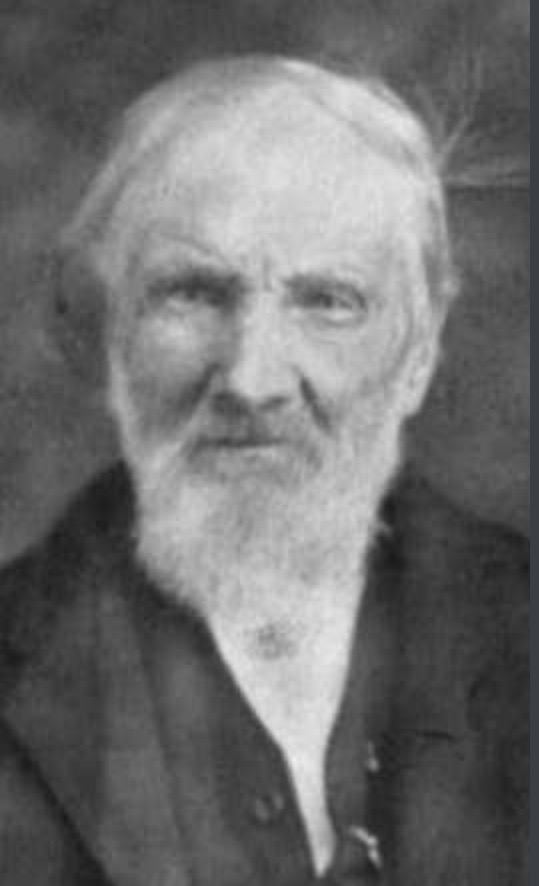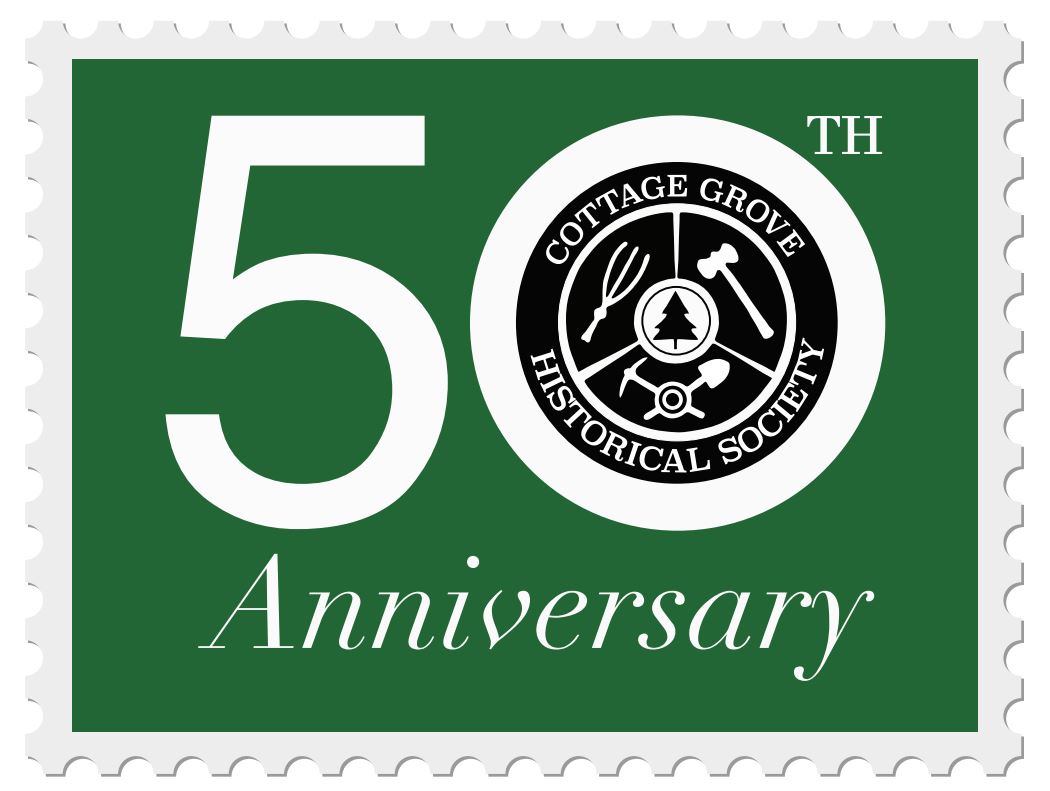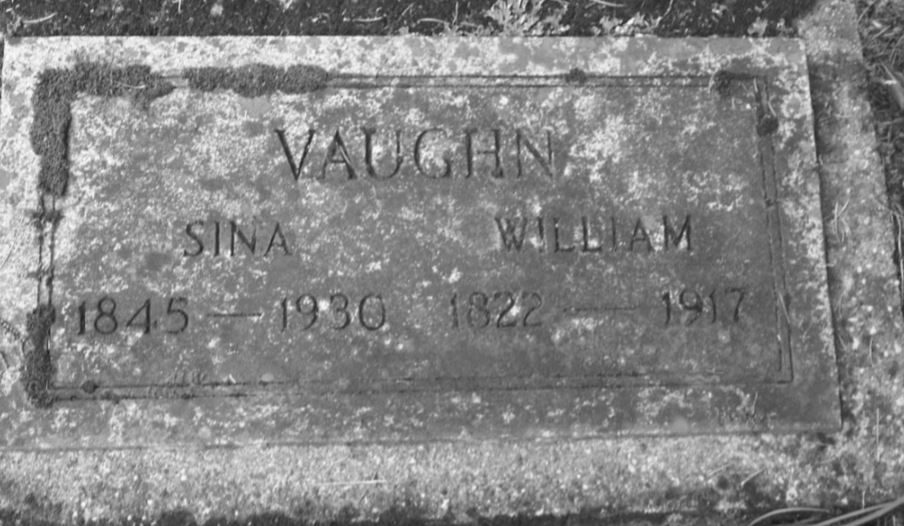Article by Gordon Grable

The year was 1853 when John Vaughn joined a wagon train in Keokuk, Iowa. The train's destination was Oregon. Mr. Vaughn at this time was 31 years old. He had been married a short time before and his wife's name was Matheble Daniels. The trip was looked on as a sort of honeymoon.
Like hundreds of others, the Vaughns pulled up their roots and looked to Oregon as their land of milk and honey. All went well until they reached the Harney Lake Country. Here, they lost the trail. The party was in bad straits: they had none of the staples left such as flour, salt, sugar, tea and coffee.
They thrashed around in the wilderness for two weeks before finding the trail again. They had butchered some of the cattle and the tough unsalted meat was their sole food. Finally getting on their way again, they made it to the Deschutes River and here again lost their way. They located a small settlement and got their bearings. They party pushed on. The summer was waning.
Years later Vaughn told of paying a dollar for a small sourdough biscuit for his wife at this settlement. He hauled in his belt another hole as he watched her eat it.
The Willamette Valley was reached at last and the people scattered, each looking for their homestead. The Vaughns settled at Cloverdale, north of Cottage Grove.
The following year he started building a flour mill It was the first flour mill in what is now Lane County. After a few years he moved the mill to Delight Valley. To run it, he flumed the water from the river. Mr. Vaughn would take a part of the flour as payment. This he sold to stores up and down the valley.
In 1863, Vaughn's wife died, leaving him with four small children. No sooner had things returned to normal, when a man named Johnson came stumbling into town with a tale of gold. Vaughn was no miner but when he saw the glitter of yellow in Johnson's hands, he couldn't resist. He was in the first party to head for the mountains. They searched, they dug for the elusive stuff and got nothing but sore backs. Years later a few of the men in the party struck it rich. As for Vaughn, he went back to his flour mill.
In 1868 he married again. The woman's name was Sina Alexander. Vaughn at this time was 46 years old. It was tough trying to run a business and raise four children at the same time. To this union seven children were born. Of the 11 youngsters he fathered, one survives today. The eleven children were: Orland, Sidney, Albert, and Alice, by his first wife: Enoch, John, Oscar, Cornelia, Etta, Viola and Leona, by his second wife.
It was around 1870 that he served a year as county commissioner. He didn't have the temperament for this kind of thing. The young county had little money and the people wanted improvements. They screamed about the mud-holes in the winter and stumps in the middle of the road in the summer. He resigned his position.
Soon after, there was a need in town for a justice of the peace. Vaughn was persuaded to run for the office. As it wasn't a full-time duty, he ran and won easily. No man ever served with a better sense of justice. Judge Vaughn, or “Squire” as he was called by some, was a man who not only believed in the
Golden Rule, but lived it.
When a person appeared before him it made no difference what the accused name was or how big his bank account happened to be. If he had something coming, he got it. So keen was his sense of fairness and popularity with the people, he served in the office for over 40 years. He won at the polls so overwhelmingly that few men had the courage to oppose him.
In the beginning of his career as a justice he kept his four mill going. It wasn't uncommon for him to grind grain all night. It was said that he could toss 100-pound sack of wheat around as if they were filled with straw. Yet this man stood barely over 5feet and weighed exactly 130 pounds. To those who knew him, his vitality and energy were remarkable.
Judge Vaughn used to tell a story about an Indian who came to the mill one day wanting a bag of flour. It was summer and the river was low. The mill couldn't run due to the lack of water. Vaughn explained this to the Indian. The Indian grunted – looked at the river and said, “Me go home now, make rain.” That night a regular deluge fell from the sky. Early next morning the Indian appeared for his flour. He got it. Coincidence? Well, Who knows?
In Judge Vaughn's career as justice he married more than 300 couples. In those days $5 was the regular fee. Many couples stand in the way of the beginning of a new family. He would take a load of firewood or a sack of chickens or most anything he could use. If the groom had neither cash or goods, he was known to put it on the cuff. There is no record of anybody cheating the judge out of a nickel for a marriage ceremony. Though deeply religious and a charter member of the Presbyterian Church, the judge smoked a pipe his entire adult life. He drank no alcohol in any form. He was given hundreds of cigars and no one ever say him smoke one as it was received. He would take he cigar – cut it up with a penknife, shred it in his hands and fill his pipe. The remainder he should put in a pouch.
At one time he had an interest in a mine in the Bohemia country. Several men owned it and one was a dim relative of the Judge. It came to pass that a monied outfit in Portland wanted to buy it. They decided to sell and the Judge trusted his relative to collect his share of the bill. In the meantime he had promised each of his kids a fine present. All waited expectantly. Then word came that the relative had run off with the Judge's share. The good Judge lost control of his emotions. He called the culprit a dirty little son-of-a-you know what. To those who heard him it was shocking. Nobody had ever heard him swear before. Nobody ever heard him swear again.
Judge Vaughn's home life was a peaceful as a Sunday afternoon (old style). Of the 11 children in his house, none ever felt the heavy hand of punishment. So complete was his control of his brood that he had only to say “hark, hark” whenever one started getting out of hand. And they loved him, every one of them.
In 1894, he closed his four mill, transportation was better and flour much easier to get. The work was getting hard for his 72 years. From then on he was in his office every day. There was plenty to do with the town being replete with brothels, saloons, miners and loggers. Saturday nights the main street was like a full-blown nightmare.
Strange as it seems, Judge Vaughn never condemned his fellow man for his shortcomings. Though whiskey was consumed like water and broken heads were evident especially after a meeting between miners and loggers, he looked with a tolerant eye. He never worked at trying to be a “do-gooder.” It is very possible that he had the foresight to know that this was part of a town growing up.
The years came and the years went, and Judge Vaughn had been in office so long he had almost become a fixture. He took on all comers each election.
There was one man who got the idea that he wanted to be justice of the peace. He ran against the judge many times. He would stump around the town and it never did him a lick of good, come election time. The people just kept right on electing the old judge.
By 1911, all of the Vaughn children that were still living were grown and had left home. The Judge had outlived most of his old cronies. He stood with bowed head as one by one they were laid in their last resting place. Men who had done their part in founding a state, a county, a town. Time ever moves on and the once brave and once strong are no more.
Ninety long and hard years were behind him and he was tired, very tired. He resigned his position. As his replacement he recommended the man who had wonted his office so long. The man got the office. His name was Alta King.
The judge went home to rest his weary bones in the old rocking-chair. From his front porch he could watch the trains go by, a far cry from the old days. Progress was in force and the whole state and everything in it was moving forward. To the very last the Judge took a keen interest in the affairs of the town.
A few months before his death he attended a meeting of the Masons that was held in honor of the older members. At the gathering he was the featured speaker. The members were astounded at the wit and vitality of this man. He was crowding 95 at the time. Judge Vaughn had been a member since 1850. In the early morning hours of March 15, 1917, Judge Vaughn passed away. Considering the life expectancy of times, he had lived almost two lifetimes. The doctor who had attended him said that he just wore out like the old, old clock. The Judge was buried in Sears Cemetery, east of town.

